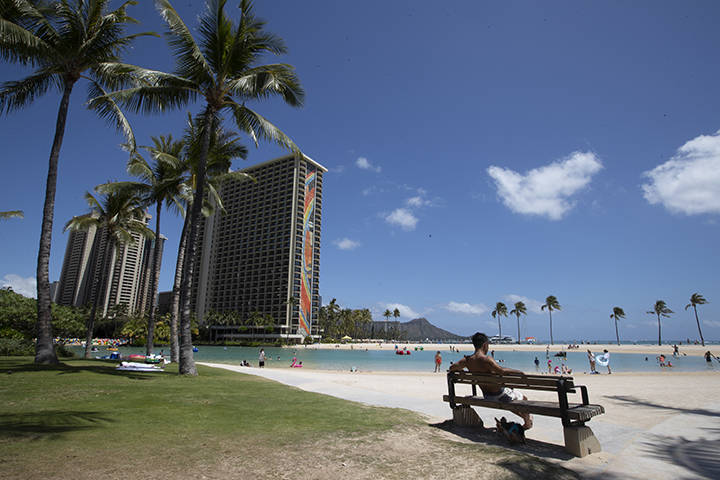The overwhelming majority of vacation rentals that have operated for the last 30 years are illegal. Their numbers — estimates start upwards of 8,000 on Oahu — already have begun declining as enforcement of the newly enacted ban on unpermitted short-term rentals proceeds, and that’s good.
But about a 10th of that number, those with nonconforming use certificates (NUC) issued before an Oahu moratorium on vacation rentals went into effect in 1989, should expect to be paying a higher rate of taxation than the residential rate they’ve been paying all this time.
Few could argue that homeowners using their residential property at least in part as a business have altered its impact on the community and thus owe the tax base more money to offset that.
The question before the Honolulu City Council is: How much more would be fair?
The Council Budget Committee on Wednesday moved out a revised version of Bill 55, which seeks to create a new tax classification for short-term rentals — lodging rented for less than 30 days.
About a year from now the city is set to launch a new system of permitting about 1,700 new hosted bed-and-breakfast (B&B) operations, adding to the 38 that now hold an NUC under the old system. These are guest homes in which an owner or resident manager serves as the “host” on-site.
B&Bs have been more acceptable to communities than the “transient vacation units,” or TVUs: unhosted, whole-home rentals which, some neighbors complain, are unsupervised and can pose a disturbance. Under the new ordinance, no new TVUs will be permitted in a residential area.
But the old NUC-permitted TVUs, numbering 770 on the current city roster, will remain. In the initial tax proposal by Mayor Kirk Caldwell’s administration, owners of these properties would pay the hotel tax rate — a notion that last week drew fiery protest from some permit holders.
Some rationale could be made for the administration’s tough position: Unhosted TVUs serve essentially the same purpose as more-conventional forms of transient lodging, such as hotels. Like hotels, they are businesses and, unlike B&Bs, do not serve a partial long-term residential function.
Also like hotels, the authorization for the guest-lodging operation can be transferred upon sale of the property. This seems unfair to the many property owners who will be waitlisted to get one of the 1,700 B&B permits to be issued next year.
New owners are required to meet the same fee and renewal requirements as the original NUC permit-holder, but they should be subject to reapplying to renew the certificate as well. As it stands, holders of the NUC have a transferable asset that applicants under the new system would lack: The new B&B permits (“registration numbers”) are expressly non-transferable under the current ordinance.
So for TVU owners, this value-
added aspect strengthens the argument that the tax should command a premium. Even if the hotel rate is applied ($13.90 per $1,000 of property valuation), the amount that is paid will be lower than a hotel, based on the latter’s higher property value.
A hotel property has additional amenities and thus a higher value than a residential rental, said Gary Kurokawa, the mayor’s chief of staff and formerly administrator of the Real Property Assessment Division.
“We wanted to make sure the playing field was level,” Kurokawa said. “If you are acting like a hotel, you should be in the same class.”
Nevertheless, it appears that there’s no appetite in the Council to charge a tax at full hotel rate for TVUs, said Councilman Ron Menor, budget committee member and chairman of the Committee on Zoning, Planning and Housing. It is true that TVUs are low-density properties that don’t put the same strain on roads and utilities as hotels.
Menor said one current revision may be a tiered system. Hosted B&Bs would be set aside in one class paying a higher-than-residential rate, with TVUs paying a somewhat higher rate than that — but with both rates lower than what hotels pay.
This would be an acceptable compromise. But, as Kurokawa rightly noted, the formulation of the tax structure will have to be done carefully. Some of the TVUs are already in the elevated Residential A class for high-end second homes, he said, and depending on where the rate is set, they could end up paying less tax than what the vacation-rental classifications would reap.
And that wouldn’t make much sense.
So even if the Council ends up with a TVU property tax rate below what hotels pay, it really shouldn’t be that much lower. Already there are units that are within the hotel zone that operate exactly the same way as a TVU in a residential zone but pay the hotel rate, Kurokawa said. That’s why a deep discount would be tough to justify.
The Council has the bill up for a final vote Dec. 4. Members should take the time to develop a tax system, one that captures enough of the profit that these in-home businesses unquestionably generate. One that’s fair, in other words.

